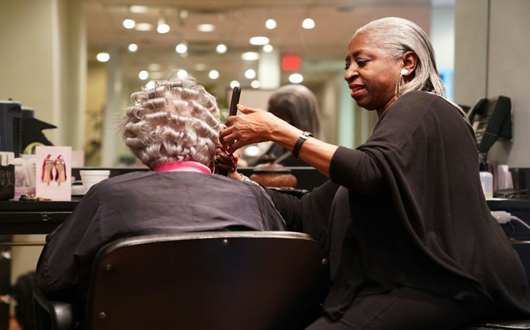SOUTHFIELD, United States, Aug 18, 2018 (BSS/AFP) – For years, Jacqueline
Robinson was a hairdresser to Aretha Franklin, invited to lavish Christmas
parties, whisked off to meet Oprah Winfrey or joining the likes of Stevie
Wonder at dinner.
The hair stylist, who trained in Europe and runs an upmarket salon near
Detroit, was heartbroken when the woman she called an “inspiration” died on
Thursday, after a long battle with cancer.
“I had a headache. I had a stomachache. I cried all day,” Robinson told
AFP, finding comfort by listening to radio stations that honored the “Queen
of Soul” by playing Aretha songs until midnight.
It was the late 1990s when the music icon telephoned for the first time,
asking Jacqueline to style her hair. When her limousine pulled out front,
people from neighboring businesses stopped to stare.
But the 18-times Grammy winner, hailed the greatest singer of all time by
Rolling Stone magazine, was never one for airs and graces, taking her seat in
the salon alongside any other customer. “She would lay back in the shampoo
bowl just like everybody else,” Robinson said Friday, perched on her
hairdresser’s stool, grey hair swept back, lipstick perfectly applied and
elegantly dressed in black.
“She never tried to project herself as ‘being Aretha’ or ‘get out of my
way.’ Never, never, never.”
The soul legend had several, if not many hairdressers in Michigan, but
Robinson was the one she chose to style her hair for appearances on the Oprah
Winfrey Show and the BET Awards.
“I would hear her singing in the bathroom when I was traveling with her,”
she recalled. “You never heard somebody singing and it sounds like a full
orchestra behind them? That’s Aretha. Beautiful voice.”
– Flying earring –
“She loved it when I did her hair,” Robinson said. “She said ‘Jacqueline
you’re very special, you have a wonderful touch.'”
Robinson’s brain is packed with indelible memories, such as chatting
backstage with Winfrey and Mary J Blige, or not a dry eye in the house after
Aretha’s performance of “Amazing Grace.”
“I mean, there were so many tears, so many tears. She’s so wonderful. Oprah
was crying. It was great.”
There were also moments of hilarity. For the BET Awards, Aretha asked her
to style her tresses into a chignon, which the performer planned to reveal as
a “wow factor” on stage by suddenly whipping off a wig.
Except, when she did, the wig sent flying a priceless earring on loan from
a jeweler in New York for the telecast.
As producers frantically cut to a commercial break, Robinson joined
everyone else on their hands and knees until the earring was found.
Music legend Stevie Wonder and R&B singer Alicia Keys were at those awards,
she remembers. “When it was over I got to eat dinner with all these people…
It was wonderful.”
– ‘Inspirational’ –
It wasn’t just hair. Aretha stopped by the same salon for $80 mani-pedis
with manicurist Shawn Frazier for 10 to 15 years. Rust orange, silver and a
blue-silver were her favorite colors, Frazier recalled.
“People were so amazed that she would just come in and just be normal. Her
security would sit up front, and her driver, but she would walk
around,”Frazier said. “She just made you feel comfortable.”
Frazier bubbled over with memories of the lavish Christmas parties that
Aretha would host, one set in a winter wonderland made to look like snow,
with music, food and invitations by special delivery.
Franklin’s signature song, “Respect,” was her calling card, a feminist
anthem and one that inspired generations of women all over the world.
To Robinson, she was also “very, very inspirational… as an African
American woman.” After training in Europe, Robinson was in the 1970s the
first black hairdresser to work at a fancy white salon.
For a year, she was an assistant, then forced to work in a back room.
Two hairdressers threatened to quit if she was hired, so each morning she
would get them coffee and clean out their ashtrays, before finally being
promoted properly, eventually leaving to set up her own business.
“Miss Franklin was very, very, very encouraging,” she told AFP. ‘Don’t be
afraid, there are enough women who are going to support you,” she remembered
Aretha saying.
“She gave us all pride,” Robinson concluded. “Aretha was always Aretha,
always high, always singing ‘I love Detroit.’ Always, she said that. So she
was inspirational for all of us.”



